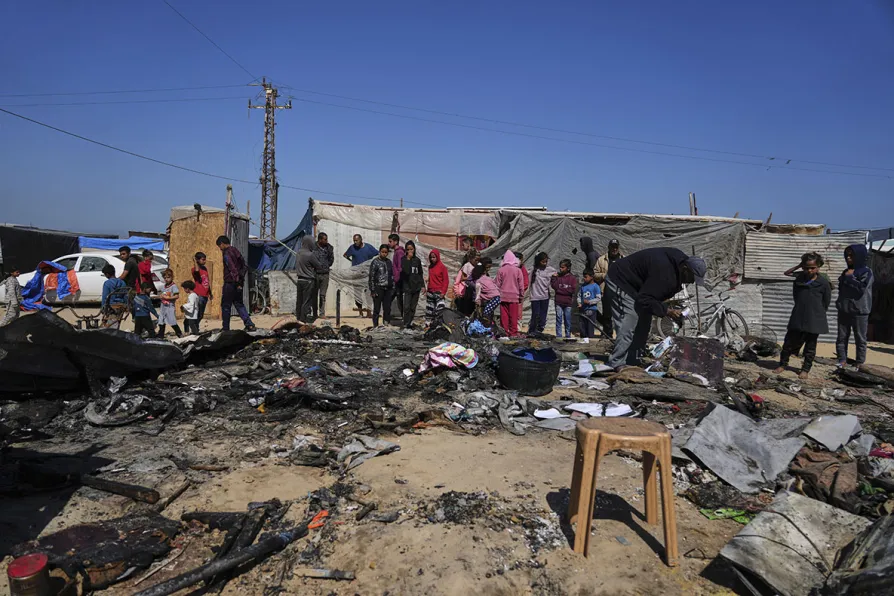
 Palestinians inspect the remains of a displacement tent hit by an Israeli airstrike overnight, killing 10 members of the Abu Al-Rous family, in Khan Younis, southern Gaza Strip, April 17, 2025
Palestinians inspect the remains of a displacement tent hit by an Israeli airstrike overnight, killing 10 members of the Abu Al-Rous family, in Khan Younis, southern Gaza Strip, April 17, 2025
ISRAELI bombardment killed at least 17 Palestinians in Gaza today, hospital workers said, hours after Hamas formally rejected Israel’s latest ceasefire proposals.
Amongst the dead were 10 Palestinians who had been sheltering in Jabaliya refugee camp, including eight from the same household, according to the Indonesian Hospital, which received the bodies.
Seven more were killed in the southern city of Khan Younis including a pregnant woman, according to the Nasser Hospital, where the bodies were brought.
Israel is demanding that Hamas release more hostages at the start of any new ceasefire and ultimately agree to disarm and leave the territory.
Israel has said it plans to occupy large “security zones” inside Gaza.
Hamas negotiating delegation leader Khalil al-Hayya said on Thursday the group had rejected Israel’s latest proposal along those lines.
He reiterated Hamas’s stance that it will return hostages only in exchange for the release of more Palestinian prisoners, a full Israeli withdrawal from Gaza and a lasting truce, as called for in a now-defunct ceasefire agreement reached in January.
Hamas holds 59 hostages, 24 of whom are believed to be alive.
Officials from Hamas had indicated earlier in the week that they were likely to reject Israel’s plan.
Mr Hayya said the far-right Israeli coalition government “use partial agreements as a cover for their political agenda, which is based on continuing the war of extermination and starvation, even if the price is sacrificing all hostages.”
He added that Hamas was “ready to immediately negotiate a deal to swap all hostages with an agreed number of Palestinians jailed by Israel” and end the war.
After Tel Aviv’s plan was rejected Israeli Finance Minister Bezalel Smotrich said it was time “to open the gates of hell” on Hamas.
Aid groups raised alarm over Israel’s blockade of Gaza on Thursday, where it has barred entry of all food and other goods for more than six weeks.
Thousands of children have become malnourished, and most people are barely eating one meal a day as stocks dwindle, the UN said.
But Israel’s Defence Minister Israel Katz was adamant this week that the blockade is a “central pressure tactic” against Hamas, which Israel accuses, without evidence, of siphoning off aid to maintain its rule.
Aid workers deny there is significant diversion of aid, saying the UN closely monitors distribution.
Rights groups have accused Israel of engaging in a “starvation tactic.”














